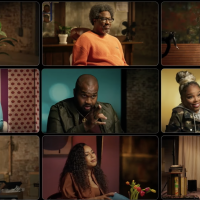In Sarah Rose Etter’s The Book of X, we enter a world technically altered but emotionally the same as ours. We follow the life of Cassie, a girl born with a knotted torso, a rare and hereditary (fictional) condition in women. Cassie tries to navigate adolescent obsession with a traumatically different body from her peers. Meanwhile, her mother, also knotted, offers her rocks to suck on to quell her appetite, and her father mines meat from their family-owned quarry. When she moves out on her own, Cassie tries to navigate adult life with a knotted body, and later, without. Her experience is punctuated by visions she has of a slightly altered world from her own, though not so altered that she’s able to see herself, even there, with real companionship.
I first met Etter in Lisbon in 2014 at the Disquiet International Literary Program. There, I got to read the stories she was writing five years before The Book of X would be published, stories different from the book, but undoubtedly from the same mind fascinated by bodies, what they mean to themselves and to others, how they’re treated, and what they’re for. These stories stayed with me and made me very much look forward to this debut, which does not disappoint my appetite for more of Etter’s ideas about bodies.
Sarah Rose Etter and I talked about just that—how Cassie’s body dictates her experience, and what her experience says about trauma and the isolation it creates in a society so consumed with perfection.
Jane Dykema: I was thinking about how relatable this loneliness is that Cassie is living, and how almost all of the contemporary discussion of loneliness is couched in a discussion of technology, how technology is isolating us, etc. But there is no specific technology happening in this world-—the world is actually free from most kinds of time markers. Do you think the kind of emotional and physical isolation Cassie is experiencing is a timeless truth for people, or do you think it has to do with her specific experience?
Sarah Rose Etter: I knew I wanted to write a story that was surreal and resisted the ability to be set during any certain year and technology is one of those markers that can give a story an absolute timeframe. I didn’t want to tackle the impact of smartphones and social media in The Book of X, because it would detract from Cassie’s experience and emotions. Once you’ve introduced a device like that into a character’s life, it’s so easy to say Oh, just go on a smartphone diet and you’ll be fine! You just need more self control!
For Cassie, though, loneliness is much more complex. Based on her body, based on her past, it’s not as simple as going to a singles mixer and opening herself up to the nearest accountant. Further, this is a society that has already decided she should be an outcast because of how she looks. Her loneliness feels, to me, like an extension of her knot—it is one of the biggest ways in which her body works as a barrier between herself and the rest of the world. And once her knot is removed physically, it does remain for her mentally. There’s something so relatable about this to me—the idea of a woman being trapped in and by her own body, and being other.
I’ve been reading a lot about the research into loneliness—how there are doctors exploring whether we can cure loneliness with a pill. That seems wrong to me, for some reason—almost as if we’re curing something medically that we could fix by seeing each other and building real relationships. It seems surreal, doesn’t it?
So much of this book is about loneliness and isolation. I suspect one of the reasons I feel so drawn to those topics is because loneliness is one of the few emotions that crosses lines of gender, race, and class. Like death, and to some extent love, loneliness is one of those major human concerns that none of us can escape. In that way, loneliness is universal—in that way, our loneliness unites us.
JD: I’m interested in what we do and don’t know about our characters and what they can teach us about what we actually think, or what they can teach us to unthink. Do you think there’s a difference between how you would describe Cassie’s trauma and how she would describe it?
Like death, loneliness is one of those major human concerns that none of us can escape. In that way, our loneliness unites us.
SRE: The ability to break out of our traumas is not easy—I think for Cassie, that was just her life. She is unable to step back and look at her life the way we can see it because she is so mired in her condition. She really represents the power of heredity in some ways—of course, we often hear for things like depression or chronic illness or pain that we need to go to yoga, practice deep breathing, try CBD. But in reality, the amount of time, money, professional help, medication, self-awareness, skill, and strength required to overcome our birthrights is not easy to come by. To me, Cassie would be the kind of person to briefly explain the entirety of her trauma in a few brief sentences over a drink with a friend and shrug at the end.
And that’s an important question: What happens to us when aren’t offered the care or recognition we need? I think frequently whenever I meet someone new how I’m not just meeting them—I’m also meeting all of their trauma, pain, and previous experiences, which combine to create their behaviors and reactions to the world. Ultimately, the amount of pain we’re all carrying is immense. If you think about it, it’s incredible that some of us keep moving through the world.
JD: Yes! I was thinking when you said they’re working on a pill for loneliness in our world, there’d be so much stigma associated with taking it at first. But is loneliness just another chemical process like depression, and if you can do yoga, deep breathe, spend time outdoors, and make meaningful connections in person all day, can you manage it “naturally”? And if your life is not organized in a way in which that’s possible, you’re poor, you support other people, you work remotely, it’s always winter, etc., then what do you do? Cassie seems like a very realistic version of what you would do.
SRE: Absolutely—we often ignore those who cannot afford or don’t have access to help, whether that’s financially, or they don’t have the knowledge or resources to reach out. And you’re right—even if we invented a pill for loneliness, who would be able to afford it? What would the side effects be? How would it serve to further isolate us? By covering up the symptoms of loneliness, how do we effectively stop trying to make connections with other people? I’m of two minds about that—in nature, we feel pain as a response to a stimulus in order to set off alarm systems in the brain so we will do something to protect ourselves. If we think of loneliness as a type of pain, how does numbing it stop us from really addressing our isolation? I don’t have a clear answer to that, but those are questions we have to ask.
In Cassie’s case, too, you have so much of the medical field basically telling her We’re not here to help you. Your experience and your body don’t matter. So when you have an institution like that essentially crushing you, what’s left to do? In many ways, after writing this, I wondered how much of the desperation came from just being a woman in America right now—from having a body that is regularly discussed, regulated, legislated, but never really understood. Or simply from watching the rights and access to medical care being stripped from so many other people.
I won’t get on a soapbox here, but if you compared the amount of money being spent to address erectile dysfunction versus the amount of money being spent to invent new forms of birth control that were cheap and accessible, the numbers would upset you. To me, Cassie represents a woman who is given almost no knowledge about her body in any form, and then sent out into a world that almost runs on sex. So much of her pain comes from that alone.
JD: This seems like a perfect opportunity to transition to Cassie as a woman in this world and her relationship to men. I laughed so hard when the boy she has a crush on in high school says, “I like it when you listen to me.” It’s so innocent and true and understandable, yet so recognizably a problem between men and women. There’s a lot of both generous and realistic prodding at these relationships. We see men who mind Cassie’s knot and men who don’t, and we’re left to wonder, what would we all want if society wasn’t always whispering our own cultural standards of beauty in our ears?
The concept of American perfection is so ingrained in all of us that we can’t help but want to be other than what we are.
The representation of men in this book is complicated, but Cassie interacts with an accurate mix of the types of suitors who would be drawn to someone with her condition. She’s also a character with no working model for a true relationship—I’d argue her parents have a fairly utilitarian relationship, so her understanding of romance is limited. Further, her inability to draw boundaries with partners feels directly tied to her self-worth.
But I do like that she explores her body despite all of that—the men she attracts in the bar, for instance, do seem like a solid representation of one night stands, while her two major loves, Jarred and Henry, are both very limited in both their feelings for her, their own emotional intelligence, and how they can be available to her. You can feel how much she’s yearning for more from everyone around her—and yes, how her mother and the men she encounters either demean her or glorify her because of her condition. In her world, there’s a clear portrayal of a mother and a series of men serving as the bullhorns for capitalist expectations of how we should look as women – whether that’s coming from her mother’s magazines or the comments of the men who see her naked. In reality, her father and Henry are the only two characters exempt from this behavior. They serve as a sort of safe harbor from that entire line of thought.
What would Cassie want without all of this? I think she’d ultimately still want to be knotless. That’s how deep all of this goes, really. Even without the mothers, men, and mouthpieces, the concept of American perfection is so ingrained in all of us that we can’t help but want to be other than what we are. I could ask anyone: What’s your knot? What would you remove from yourself?
JD: I was so struck by how you treated the knot’s removal. When she’s younger, before her knot is removed, Cassie’s visions feature a smooth, unknotted belly, and the receipt of desire and acceptance that she perceived would come with it. And after it’s removed, we don’t see a huge internal celebration, much change in the way she’s treated, or even her noting it too much. What is the link as you see it between Cassie’s belief about what she looks like and her reality?
SRE: There’s an incredible book called The Body Keeps The Score that helped me portray Cassie’s experience with pain and trauma. That book is written exceedingly well, but it’s also full of research about what happens to the body and the brain after a traumatic experience – and the brain is literally re-wired after we undergo a trauma.
So, ultimately, a trauma is never “over.”
And even when it comes to our bodies, that seems to be an idealization to me. Sure, we can have surgeries to look like each other and then continue to operate in the world, but some wounds stay with us forever and I mean that literally. There is no erasing our traumas from our minds or our bodies, not really.
Post-surgery, I wanted to show that she continues to be judged by her body. Her place in the world doesn’t elevate without the knot because it was only the cosmetic she changed—she never addressed her core issues. That’s why her relationships stay largely the same. She is ultimately able to attract a partner and fall in love. In my mind, her relationship with Henry, and his acceptance of the scars on her body post-knot removal do a lot of work to obliterate her trauma for a brief stint. It gives her a few months of relief and acceptance of herself.
But in the end, her trauma and her experience are both still there, lurking beneath the surface, waiting to re-emerge, forcing her to address them. At times, I felt like the book was really a portrayal of someone battling depression and losing the fight. Her surgery illustrates that—she didn’t do the real work, and so there can be no true change.
With Cassie, it also felt important to me to reject the idea that life always gets better. It’s very American, in some ways, this arc of improvement that we constantly return to. And those are the books that sell, right? The books that tell us we can refine ourselves and improve. There’s this urge to tell each other life always gets better if we just get the next thing—the next surgery, the next phone, lose the next ten pounds, get the next great job, the next car. That is what feels so American about some of those more mainstream narratives.
JD: What are some non-American books you admire that don’t have this sort of improvement of life narrative?
SRE: Oh, this list will be long! Ha! From France, Bonjour Tristesse by Francoise Sagan definitely comes to mind, as does The Book of Words by Jenny Erpenbeck from Germany. Both of these are really coming of age stories that take place during difficult times—familiar divorce and war, respectively – but leverage short, sparse sentences to drive their narratives forward. Neither end on what I’d call a redemptive or happy note. Similarly, Why The Child Is Cooking In The Polenta by Aglaja Veteranyi, a story about a traveling Romanian family in the circus, is a spliced together, fragmented narrative that leads somewhere quite dark. Fever Dream by Samanta Schweblin, of course, too—another one that ends with a sad bang.
Let’s even go beyond books to talk movies. I think here of The Lobster and The Favourite—both of these movies, by Yorgos Lanthimos, grapple with love, violence, and power without leaving the viewer in a safe, soft place. Rather, they imply life never gets better, really—it only gets more desolate. Both of those movies really stuck with me—I think I saw The Favourite four times while I was editing The Book of X, and I felt like it did give me some power to let the story end how it should, however harrowing that might be.
Again, it just seems to me there is more freedom for art to be raw and unsolvable whenever I look internationally. I love a lot of what’s happening in America, of course—Halle Butler, Carmen Maria Machado, Amelia Gray, and plenty of other writers are pushing American weirdness forward. Caren Beilin’s Spain was one of the most exciting books published stateside that I read this year. I was also really crazy about Trisha Low’s Socialist Realism, and Ultraluminous by Katherine Faw. So of course, there are still interesting things that are happening in America—I just tend to feel there’s a little more weird happening beyond our country, or a weird that appeals to me very much. I always get so excited for works in translation for this exact reason. I want to understand the global weird.
The post There’s No Surgery for Loneliness appeared first on Electric Literature.
Source : There’s No Surgery for Loneliness












